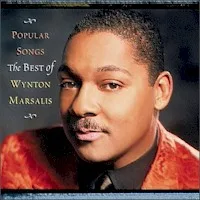Bitrate: MP3@320K/s
Time: 75:08
Size: 172.0 MB
Styles: Trumpet jazz
Year: 1997
Art: Front
[ 6:01] 1. The Party's Over
[ 6:35] 2. You're Blasé
[ 5:42] 3. After You've Gone
[ 7:43] 4. Glad To Be Unhappy
[ 6:03] 5. It Never Entered My Mind
[ 5:24] 6. Baby, Won't You Please Come Home
[ 5:55] 7. I Guess I'll Hang My Tears Out To Dry
[ 5:03] 8. I Got Lost In Her Arms
[ 5:46] 9. Ballad Of The Sad Young Men
[ 4:26] 10. Spring Will Be A Little Late This Year
[ 4:31] 11. My Man's Gone Now
[11:53] 12. The Midnight Blues
Wynton Marsalis (trumpet); Robert Freedman (conductor); Paul Peabody, Israel Chorberg, Krista Feeney, Richard Henrickson, Jean Ingraham, Ann Leathers, Nancy McAlhany, Ron Oakland, Susan Ornstein, Sandra Park, John Pintavalle, Matt Raidmondi, Laura J. Seaton, Lisa Steinberg (violin); Lamar Alsop, Julien Barber, Carol Landon, Sue Pray, Maxine Roach (viola); Richard Locker, Eric Friedlander, Eugene Moy (cello); Eric Reed (piano); Reginald Veal, John Beal, Lawrence Glazener, Paul Harris (bass); Lewis Nash (drums).
In his book, Lives of the Great Composers, Harold C. Schonberg titles each composer's life with a short, densely descriptive phrase. He titles the chapter on Johannes Brahms, "Keeper of the Flame." He opens the chapter with this comparison of Richard Wagner, J.S. Bach and Brahms: "Wagner was a revolutionary, spearheading the future. Brahms was the classicist who dealt with abstract forms and never wrote a note of program music in his life, much less an opera. Wagner was to exert enormous influence on the future. With Brahms the symphony was handed down by Beethoven, Mendelssohn, and Schumann and came to an end. Brahms, like Bach, summed up an epoch. Unlike Bach, he contributed little to the development of music."
With a small amount of editing, these lines could readily be adapted to the historic relationship between Miles Davis and Wynton Marsalis. Miles Davis was long the revolutionary, while Marsalis has been the classicist flame keeper. He is an academic and an archivist. Wynton Marsalis is our consummate jazz scholar and practitioner. It is these traits that are both good and bad about Marsalis recordings. I have found all of Marsalis' recordings of uniformly high quality. His playing has always been inventive and appropriate for what he was trying to say. His influences? Well, that depends on the piece and the period. Marsalis has so broadly listened to and studied the history of jazz trumpet that he has internalized a plethora of styles and influences. I hear Miles, Clifford Brown, Chet Baker, the list goes on and on. His tone is perfect, his vibrato is perfect, and his delivery and ideas are perfect. All of this perfection is Marsalis? only problem. I find his music without emotion. It is a studied delivery of a variety of notes presented in a variety of styles in a variety of well-crafted arrangements. Despite this grump, I thoroughly enjoy all Marsalis' recordings, including his newest one, The Midnight Blues: Standard Time Vol. 5.
I recently listened to Clifford Brown with Strings and found that I enjoyed this music much more than the majority of critics I had read. I look forward to all of Marsalis' standards recordings and when I gave this new one a spin, I was delighted with the results. Like Clifford Brown with Strings, it is a collection of ballads with a jazz rhythm section and strings. All of the ballads are tastefully chosen and performed, providing even a few surprises. Marsalis' choice of ballads cannot be called cliche. The best known "standards" on this disc are "It Never Entered My Mind" and "I Guess I'll Hang My Tears Out to Dry," both of which are skillfully performed. Marsalis' tone ranges from sleepy seductive on "You're Blase" to the entire tonal landscape on "Baby, Won?t You Please Come Home." This latter song is the disc's centerpiece. Here we find Marsalis opening with almost an accompanist's muted obligato (like Miles for Shirley Horn) for the introduction and the first chorus. He then moves into a manually muted mode recalling Cootie Williams, making his trumpet cry in a pinched and nervous plea. Eric Reed skips through the next chorus, until Marsalis reenters with an open bell that begins in a Clifford Brown sentimental manner, the tone full, round and luscious. The scene quickly changes, heating up into a full blues lament with the strings and rhythm section urging Marsalis toward resolution.
A piano trio rhythm section comprised of Eric Read on piano, Reginald Veal on bass and Lewis Nash on drums, supports Marsalis. Their contribution is solid, tasteful, and capable. The liner notes make it a point to inform the listener that the jazz group performed live with no overdubs, a fact not readily apparent because of the quality of the playing. But this disc is all Wynton Marsalis in the same way that the Galaxy Art Pepper Quartets were all Art Pepper. Mr. Marsalis performs the majority of this disc with an open bell. His technique is flawless and contains the whispers of every major jazz artist he has ever heard. He is more Louis Armstrong than Dizzy Gillespie, more Howard McGee than Fats Navarro, more Roy Elderidge than Miles Davis, more Miles Davis than, well, let?s just leave it at that. Wynton Marsalis is important for the same reason Ry Cooder is. He preserves the testament that is mainstream jazz. His passion for the music makes up for his technique over passion in the music. All of this silly quibbling aside, this is a very accessible and enjoyable disc and I highly recommend it. ~C. Michael Bailey
The Midnight Blues mc
The Midnight Blues zippy




















